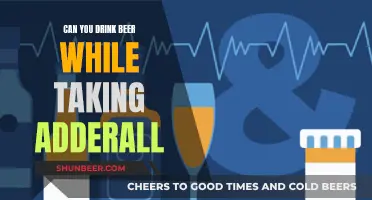
Drinking beer and smoking cigarettes are often associated with sex and having a good time. However, excessive alcohol consumption and smoking have been known to increase the chances of erectile dysfunction (ED). Erectile dysfunction is the inability to get or maintain an erection firm enough for sexual activity. While moderate alcohol consumption can help calm the nerves, too much alcohol can act as a depressant and cause weak erections. Research shows that drinking more than the advisable amount regularly and frequent smoking can lead to poor sexual performance and lower satisfaction for the people involved.
Nicotine in cigarettes builds up plaque in the arteries, which can block blood flow to various organs, including the penis. Tobacco consumption not only reduces libido but also negatively affects fertility levels by deteriorating the quality of sperm. Similarly, excessive alcohol consumption can cause permanent damage to blood vessels and nerves, which can impact one's ability to get an erection.
| Characteristics | Values |
|---|---|
| Can drinking beer and smoking cigarettes cause ED? | Yes |
| What is ED? | Erectile dysfunction is the persistent or recurrent inability to achieve/maintain an erection sufficient for satisfactory sexual performance. |
| How does drinking beer affect ED? | Drinking too much alcohol can cause weak erections, reduce sex drive and affect one's ability to maintain an erection. |
| How does smoking cigarettes affect ED? | Smoking damages the circulatory system, making it harder for blood to reach the penis and create an erection. |
| How does drinking beer and smoking cigarettes together affect ED? | Drinking more than the advisable amount regularly and frequent smoking can lead to poor sexual performance and lower satisfaction for the people involved. |
What You'll Learn
- Nicotine in cigarettes builds up plaque in the arteries, blocking blood flow to the penis
- Drinking excessively can dehydrate the body, leading to increased levels of angiotensin, which narrows blood vessels
- Tobacco consumption can deteriorate sperm quality, negatively affecting fertility levels
- Excessive alcohol consumption can cause permanent damage to blood vessels and nerves
- Drinking heavily can lead to high blood pressure, a risk factor for sexual dysfunction

Nicotine in cigarettes builds up plaque in the arteries, blocking blood flow to the penis
When a male is sexually aroused, the body releases chemicals that cause blood to flow into the spongy tissue in the penis. The blood pressure keeps the penis firm, or erect, during sex. After ejaculation, the blood flows back into the male’s circulation, and the erection is reduced.
Smoking damages the circulatory system, making it harder for blood to reach the penis and create an erection. The nicotine in cigarettes builds up plaque in the arteries, which can block blood flow to various organs, including the penis. This blockage can cause weak erections and even erectile dysfunction.
Research shows that smoking more than 10 cigarettes a day can significantly increase the chances of ED. The effects are generally irreversible, even if one stops smoking later in life. Smokers are twice as likely to have ED compared to non-smokers.
In addition to the direct impact of nicotine on the circulatory system, smoking also increases the risk of developing health conditions that can cause ED, such as heart disease and type 2 diabetes. These conditions can further exacerbate the problem of reduced blood flow to the penis, making it even more difficult to achieve and maintain an erection.
While quitting smoking can improve ED in many cases, it is not always effective, especially in severe cases. Quitting smoking can improve blood circulation, making it easier for blood to flow into and stay in the penis during sexual activity. However, smokers with severe ED may never regain normal erectile function, even after quitting.
Beer Traps: Effective Earwig Control or Urban Myth?
You may want to see also

Drinking excessively can dehydrate the body, leading to increased levels of angiotensin, which narrows blood vessels
Drinking alcohol excessively can have a dehydrating effect on the body. Dehydration can lead to an increase in angiotensin, a hormone that constricts blood vessels, limiting blood flow to the penis. This can result in weak erections and erectile dysfunction (ED).
Angiotensin is a key regulator of blood pressure and fluid balance in the body. When the body is dehydrated, angiotensin levels rise, causing blood vessels to narrow and blood pressure to increase. This is a normal physiological response aimed at maintaining blood pressure and conserving fluid. However, in the context of ED, the narrowing of blood vessels can restrict blood flow to the penis, making it difficult to achieve and maintain an erection.
Excessive alcohol consumption can also affect hormone levels and the nervous system, both of which play crucial roles in achieving and maintaining an erection. Alcohol can depress the central nervous system, slowing down the transmission of information between the brain and penis, leading to decreased sensitivity. Additionally, alcohol can lower testosterone levels, which is significant because testosterone deficiency limits nitric oxide production. Nitric oxide is the key molecule that relaxes the blood vessels in the penis, facilitating blood flow.
The impact of excessive drinking on erectile function can be both short-term and long-term. Short-term or temporary ED can occur after consuming any type of alcohol due to its dehydrating and nervous system-suppressing effects. However, chronic or long-term overconsumption of alcohol can cause permanent damage to blood vessels and nerves, leading to more persistent ED.
It is important to note that moderate alcohol consumption, typically defined as up to one to two drinks per day, does not carry the same risks as excessive drinking. In fact, moderate drinking may even have some potential benefits for cardiovascular health, including a lower risk of heart attack and possibly other forms of cardiovascular disease.
Beer After Best Before Date: Is It Safe to Drink?
You may want to see also

Tobacco consumption can deteriorate sperm quality, negatively affecting fertility levels
Tobacco consumption can indeed deteriorate sperm quality, negatively affecting fertility levels. Research has shown that smoking has a detrimental effect on various parameters of semen analysis. For example, a study of 2542 healthy men found that smokers had lower semen volumes, sperm counts, and percentage of motile sperm compared to non-smokers. Another study of 1786 men undergoing infertility workup showed that smoking was associated with decreases in sperm density, total sperm count, and total motile sperm.
Smoking can also affect the physiological processes that contribute to sperm quality. For instance, smoking increases oxidative stress and damages the chromatin structure of sperm, impairing its fertilization capacity. Additionally, smoking can cause a hormonal imbalance in the endocrine system, which can indirectly affect sperm production.
The negative impact of smoking on sperm quality is further supported by a study that examined the effects of oral nicotine on male rats. The study found that rats exposed to oral nicotine experienced significant decreases in sperm motility and sperm count. This suggests that nicotine may play a significant role in the adverse effects of smoking on fertility.
Furthermore, the effects of smoking on sperm quality can be dose-dependent. Some studies have found that men who smoke more than 20 cigarettes per day experience a more significant reduction in sperm concentration compared to those who smoke fewer cigarettes.
In summary, tobacco consumption has been consistently linked to a decline in sperm quality, which can negatively affect fertility levels. The available evidence suggests that men should be advised to abstain from smoking to improve their reproductive outcomes.
Drinking Beer on Myrtle Beach: What's Allowed?
You may want to see also

Excessive alcohol consumption can cause permanent damage to blood vessels and nerves
Excessive alcohol consumption can have a detrimental impact on the body's circulatory system, which can have severe consequences for cardiovascular health. Alcohol is a major risk factor for high blood pressure (hypertension), which is the leading cause of cardiovascular disease.
Alcohol affects the nervous system, which helps regulate blood pressure. It also impacts receptors in blood vessels near the heart that help maintain blood pressure. Furthermore, alcohol increases stress hormones like cortisol, which can increase heart rate and blood pressure.
Chronic alcohol consumption can also lead to malnutrition, as it affects the absorption of essential vitamins and nutrients required for a healthy nervous system, such as vitamin B1 (thiamine). It can also cause oxidative stress and inflammation, which are associated with damage to the myelin around the nerves (demyelination) and important neurons (axonal degeneration).
The toxic effects of alcohol consumption can, over time, cause permanent damage to blood vessels and nerves, increasing the risk of cardiovascular disease, including heart disease and stroke.
To reduce the risk of alcohol-related harm, it is recommended that males do not exceed a consumption of two drinks per day, and females do not exceed one drink per day.
Paxlovid and Beer: Is It Safe to Mix?
You may want to see also

Drinking heavily can lead to high blood pressure, a risk factor for sexual dysfunction
Drinking heavily can lead to high blood pressure, which is a risk factor for sexual dysfunction. Alcohol consumption of three or more drinks per day clearly raises blood pressure, one of the most important cardiovascular risk factors. As a result, consumers of three to five drinks per day have a roughly 50% higher risk of high blood pressure. Lighter intake, however, has generally not been associated with blood pressure and, in a few studies, has even been associated with a modestly lower risk of hypertension.
In addition, drinking heavily can lead to chronic erectile dysfunction by causing permanent damage to blood vessels and nerves. A 2021 review of studies found a significant relationship between regular alcohol consumption and erectile dysfunction. According to the review, anywhere from 16 to 73% of chronic heavy alcohol users experience dysfunction of the autonomic nervous system, with erectile dysfunction being the most common symptom.
Drinking heavily can also lead to a drop in testosterone levels, which can cause erectile dysfunction. Testosterone deficiency limits nitric oxide production, the key molecule that relaxes the blood vessels in the penis.
Beer Consumption: 3-a-Day Habit, Alcoholism or Enjoyment?
You may want to see also
Frequently asked questions
Erectile dysfunction (ED) is the inability to get or maintain an erection firm enough for sexual activity.
Consuming large amounts of alcohol in a short period can cause changes in the body that make it difficult to get an erection. Chronic overconsumption of alcohol can cause permanent damage to blood vessels and nerves, leading to ED.
Smoking tobacco products can damage the circulatory system, making it harder for blood to reach the penis and create an erection. Nicotine in cigarettes builds up plaque in the arteries, blocking blood flow to the penis.
Excessive alcohol consumption and frequent smoking are risk factors for developing ED. Research suggests that smoking more than 10 cigarettes a day significantly increases the chances of ED.
Yes, quitting can improve ED in many cases. It can improve blood circulation, making it easier for blood to flow into and stay in the penis during sex. However, smokers with severe ED may never regain normal erectile function.







